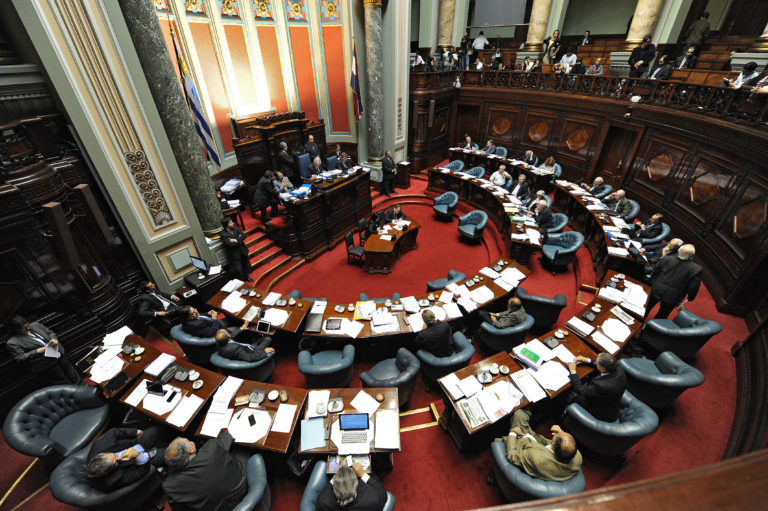(WPFC/IFEX) – The following is a 27 March 2009 WPFC letter to the House of Representatives: Constitution, Policies, General Legislation and Administration Committee House of Representatives General Assembly of Uruguay Legislative Palace Montevideo, Uruguay To the attention of Representatives Javier Salsamendi, Beatriz Argimón, Gustavo Bernini, Gustavo Borsari, Diego Cánepa, Luis Alberto Lacalle, Alvaro Lorenzo, Edgardo […]
(WPFC/IFEX) – The following is a 27 March 2009 WPFC letter to the House of Representatives:
Constitution, Policies, General Legislation and Administration Committee
House of Representatives
General Assembly of Uruguay
Legislative Palace
Montevideo, Uruguay
To the attention of Representatives Javier Salsamendi, Beatriz Argimón, Gustavo Bernini, Gustavo Borsari, Diego Cánepa, Luis Alberto Lacalle, Alvaro Lorenzo, Edgardo Ortuño and Jorge Orrico.
Distinguished Representatives:
The World Press Freedom Committee ( http://www.wpfc.org ) – an organization representing 44 press freedom groups from throughout the world – expresses its great concern about the current stagnation of a bill to eliminate insult laws and to decriminalize criminal defamation ones, which has already been passed by the Senate, especially now that this initiative is about to lose its legislative validity.
The bill, introduced in July by President Tabaré Vázquez, would eliminate the crime of insult, whether written or spoken, and expressly states that no one shall be punished for expressing his or her discrepancies with a public official. Also, the crimes of insulting the national symbols and attacks against the honor of foreign heads of state shall be eliminated.
The initiative would correctly decriminalize defamation when those expressions refer to “issues of public interest involving both public officials and public persons who, because of their profession or activity, enjoy a social relevancy or any person who has chosen to be involved in public affairs.”
The bill also respects the concept of real malice as a fundamental standard to evaluate these matters, which would also protect inaccurate expressions by “considering the real will of a person to aggravate or violate the privacy of another person.”
The legislative project is the result of a friendly agreement finalized on September of 2007 between the Uruguayan State and the Inter-American Commission of Human Rights about the criminal defamation conviction against journalist Carlos Dogliani, initiated in your country in 2004 by the mayor of the town of Paysandú.
The case went all the way to the Supreme Court, which ruled that the right to a person’s honor limits the right to free expression. Also, the magistrates dictated that the factual base of the information was not a relevant aspect of the defense and that even an accurate piece of information can constitute defamation.
The inter-American system rightly agreed that Mr. Dogliani was the victim of a great injustice and following a long process, the Uruguayan State agreed to a profound reform of its laws according to the Commission’s guidelines.
Five years have gone by since this sad process started, and the promises of reform by the State are still stuck in your prestigious House of Representatives.
Insult laws constitute an effective weapon of intimidation and repression of the free flow of ideas and expressions. These laws are the legacy of a colonial or autocratic past that found their origins in the Roman Empire, which created them to shield the emperor from the criticism of the people.
Criminal defamation laws constitute a veritable Damocles sword dangling over the heads of Uruguayan journalists, who risk their freedom or livelihood or both merely by fulfilling their duty of keeping the public informed, as was the case of Mr. Dogliani.
Both sets of laws present a clear challenge to the recommendations and jurisprudence of the inter-American system of justice, which has concluded that insult laws must be completely eliminated from the legislation of member states and that defamation statutes should be part of civil codes, and never criminal ones.
Therefore, Messrs. and Ms. Representatives, we urge you – before the bill loses its parliamentary validity – to approve it as soon as possible so that Uruguay can be integrated into the growing community of nations who view these laws as a certain challenge against freedom of expression and of the press, second only in severity to physical threats or attacks on the news media.
Respectfully,
E. Markham Bench
Executive Director
World Press Freedom Committee


